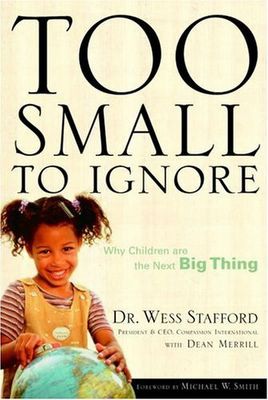In the time it takes you to read this blog, 13 people died of tuberculosis, 20 people died of AIDS, and more than 5,500 babies died from preventable respiratory infections. Fatalities from HIV/AIDS in sub-Saharan Africa create 100,000 new orphaned children each month. One child dies of malaria in Africa every 29 seconds, one person with HIV every 6 seconds, one person with TB every 18 seconds and a pregnant woman from complications with childbirth every 60 seconds. We rush too help victims of natural disasters when malaria alone is an natural disaster that kills 80,000 people every month.Fully 6,000,000 children (not even counting adults) die every year from preventable diseases.

My wife and I have a wonderful friend named Bethany. She's one of those rare souls who you are convinced you are a better person for knowing.
She spent a few hours with us before Christmas, sipping tea in our living room while on her way home to Minnesota from Peru. She'd been living in Peru as a staff member for
The Hope Alliance, an organization started by a Joe Mitchell, one of our pastors, and dedicated to dramatic, positive and lasting impact on children and families in the third world.
Bethany was in our living room because her time in Peru was finished. We thumbed through a wonderful photo album and lived the life of a tireless aid worker vicariously through her eyes. They were images of extreme poverty, extreme need, but also extreme love and devotion.
She described the reverse culture shock of coming home and being awash in guilt at the sheer opulence of our American lifestyle. She wandered superstores and megamarts in a daze. Confronted by closets of clothes she hadn't even seen since leaving for South America, she gathered them all up and gave them all away. The smallest picture in a magazine or shortest news story on the third world brought her to tears.
We were naturally curious what she intended to do next.
“Nursing school,” she said with the sort of broad, radiant smile only she can pull off. “I'm going to build on my pre-med degree, get my nursing licenses and get back to the third world as soon as I can. I know I can make a difference there.”
I couldn’t help but cry.
* * *
The perception that the United States is the most generous country in the world is one held by a majority of Americans. While the United States gives the most foreign development aid in terms of dollars, it ranks lowest among wealthy countries in terms of official development assistance as a percentage of gross national income.
A recent poll by the Program on International Policy Attitudes, which compiles and examines public attitudes toward various international topics, found that the average American believes that the U.S. spends almost a quarter of its budget on assistance to developing nations.
The truth? Less than a quarter of 1%!
“Among advanced countries,” TIME magazine revealed in a recent issue focusing on poverty, “the U.S. ranks last in foreign aid development giving as a percentage of national income.”
Following the tsunami that devastated Asia, the U.S. donation was a measly 12 cents per capita, putting it squarely at the bottom of all developed nations. While it is true that the U.S gave somewhere around $2.4 billion in humanitarian relief and aid in 2004, it also, by conservative estimates, spends that much on the war in Iraq every 20 days!
America's perception of itself as the most generous country in the world is sadly contradicted by reality.
* * *
While few would accuse the West of somehow causing third-world poverty (though there are certainly compelling arguments both for the genesis and sustainment of poverty by superpowers throughout the past couple centuries), many would insist that the West, because of the very nature of its splendid affluence, should do more, should, in fact, lead the way in humanitarian relief. With great power and wealth comes great responsibility. Or as the Scriptures put it, "To whom much is given, much is required."
It's not hard to argue for more when most of us do nothing at all.
In this global society, shrinking more and more each day, bringing us closer and closer to pain, who is our neighbor if not the small child dying of malaria in Cambodia, the Indian man perishing from AIDS, the Haitian couple who have yet to give their five-year-old child a name because the likelihood of it reaching its fifth birthday is so slim, or the young mother barely keeping her children alive in a refuge camp in the Sudan. No one is postulating a world in which "our neighbor" is taken care of at the expense of our own families. Obviously, it is to our own families that we bear the first and primary responsibility. However, there is a vast difference between enough and overabundance. Once our needs are met, do we not have a responsibility to then alleviate the burdens of others--the homeless man across the street and the refuge across the ocean?
The opposite of poverty is not wealth. It is sufficiency.
"Providing for our children is important, but it isn't nearly as crucial as many American couples seem to think," says Wess Stafford. "Enough
really is enough. Trust me on this: there actually is a type of poverty on the far side of "enough"; wealth and possessions often bring a misery and emptiness all thier own. Beyond "enough" can be lost opportunity..."
Many cite Biblical passages such as Christ's words that "the poor will always be among you" as an excuse to throw in the towel before the battle has even begun. They would rather twist Scripture to support their lack of empathy and action than roll up their shirt-sleeves and get dirty. Others feel that overwhelming poverty and the systemic death that it brings are unfortunate but unavoidable facts of the world in which we live. But, if aid workers could get across only one thing, I think it would be that that is simply not true!
No, we will not be able to entirely eradicate poverty from this planet, much as many well-meaning people have claimed. But there is so very much we can do. And for those, we have an obligation to do it. Millions die every year from the sort of preventable diseases you and I in the West consider a part of ancient history. Where we can help, we must help. To say that the need is overwhelming is understandable. But to do nothing is unconscionable. To do nothing is sin.
The good news seems to be that, while our government fails to recognize or care about the need, ordinary Americans are becoming energized to enact real change. Donations among the U.S. citizenry is way up, especially after the enormous tragedies of recent years and months. While helping the less fortunate has always been a sincere, if misunderstood, American tradition, it seems, of late, to have taken on a greater urgency.
The Bible contains over 2,000 verses relating to the poor and the Christian's duty toward them. Why then do Christians not do more to aid the poor? Obviously the poor are on God's heart. Why do we ignore clear Scriptural mandates in favor of railing against obscure peccadillo sins? If the church is the body of Christ, then that body has lost its hands and feet. The mouth sure works fine. Why is it that the church is known more for what it is against that what it is for?
There would be no need for parachurch relief organizations like Compassion International if the Church was doing its job. And thank God for them. But it is now time for the Church universal to take back what it left behind. It is time for it to lead the way.
The Church is finally waking up to the AIDS crisis overseas, let alone global poverty. Behind the ball on social issues for the past half century or more, it should never have ceded it's place as the vanguard of humanitarianism. Sure, missionaries have combed the planet looking for souls to save--a worthy endeavor if ever there was one--but more often than not, it was done at the expense of those soul's bodies.
This trend seems to be reversing.
At Radiant Church Assembly of God, the church in which I was raised, short-term missions groups no longer go to countries to stand on sanitary street corners and proclaim the gospel. Instead, the church has adopted various villages around the world to which they return several times a year. They spend their time working and sweating, building bridges and cisterns and waterways and clinics and latrines and houses and then and only then do they allow themselves the liberty of sharing the gospel.
That is as it should be.
Rick Warren, author of “The Purpose Driven Life,” and a leading evangelical celebrity has committed himself and his church to reforming the African continent. Warren believes government-driven programs have proven to be ineffective because multiple crises overwhelm their resources. In some instances, billions of dollars in aid and development have created a dependency that has only made vast sections of Africa worse. His "Purpose-Driven Nation" initiative aims to harness businesspeople, politicians, and pastors to combat the world's largest social problems. But it doesn't start there.
"Every revival and spiritual awakening in history starts with the peasants, not with the kings. It starts with average, ordinary people," Warren says. "There are not enough superstars to win the world. It has to be done by average people."
Warren hopes to enlist 1 billion individuals through thousands of American congregations for mission projects.
One of the most active groups in alleviating the suffering of Africa and other impoverished countries is the
ONE campaign, popularized by Bono, the lead singer of the group U2. Their purpose statement is, "We believe that in the best American tradition of helping others help themselves, now is the time to join with other countries in a historic pact for compassion and justice to help the poorest people of the world overcome AIDS and extreme poverty. We recognize that a pact including such measures as fair trade, debt relief, fighting corruption and directing additional resources for basic needs - education, health, clean water, food, and care for orphans - would transform the futures and hopes of an entire generation in the poorest countries, at a cost equal to just one percent more of the U.S. budget. We commit ourselves - one person, one voice, one vote at a time - to make a better, safer world for all."
Pretty heady stuff.
"On one side of this international bridge," says Wess, "my role is to minister to the poor, to ‘comfort the afflicted.’ And then I cross the bridge, coming back to the Western, more affluent word, where my role is to speak and write to ‘afflict the comfortable.’ To do that with the same love can be a challenge."
* * *
Like Wess, my mother
grew up in Africa in the small western country of Burkina Faso, then Upper Volta. I had the deep honor of visiting Africa with her and my grandparents a few years ago and it had a profound affect on me. Having lived in Europe for years, it was a startling cultural change to transition from grand cathedrals, palaces and boulevards to mud huts, breathtaking poverty and starving children.
If I forgot all else about that trip, the one thing I can never forget are the faces of the children--their quizative faces as they followed this white man through the villages, hiding in mock or sincere fear every time I turned and caught sight of them; their shinning faces as I handed out balloons and candy; their rapt faces as they listened to my grandfather preach in churches he'd built nearly a half century earlier.
I so want to go back. I want to spend more time with those children. I want to hold them once again. And someday my wife and I hope to adopt one.
For now, my adoption is through Wess and his wonderful Compassion team. Divya is 15 years old. She lives in India. I've been
sponsoring her since she was eight. We enjoy trading letters back and forth and learning more about each other.
It isn't much and it isn't all I do, but it is a start. Just think of where the world would be if we all made a start.
"God is not interested as much in our ability," says Wess, "as our availability. If you don't have a cause or mission in life, then please take mine! I implore you to join me in this battle for the hearts, souls, minds and bodies of children."
You never stand so tall as when you stoop to help a child.










